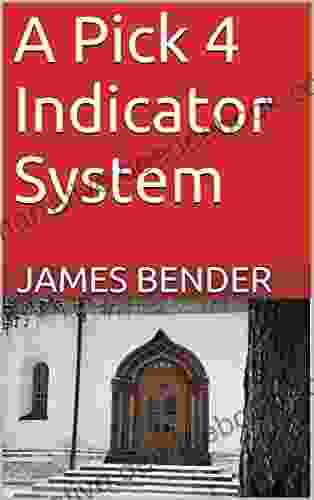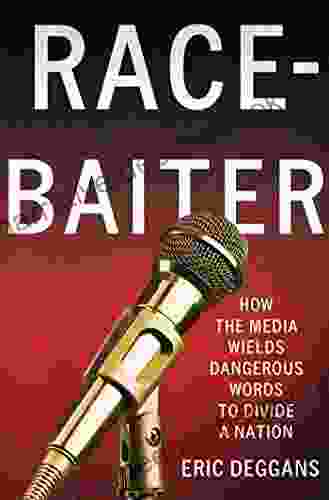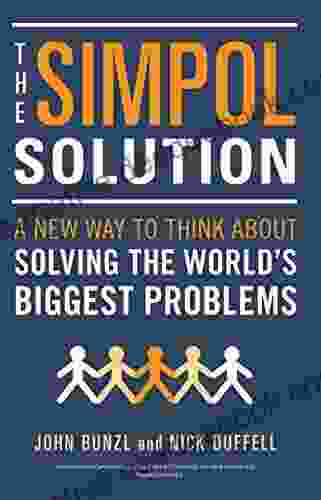A New Way to Think About Solving the World's Biggest Problems

The world is facing a number of unprecedented challenges, from climate change to poverty to inequality. Traditional approaches to problem-solving have often failed to address the root causes of these issues, and have instead led to unintended consequences. A new way of thinking is needed, one that is based on a deep understanding of the complex systems that govern our world.
4.8 out of 5
| Language | : | English |
| File size | : | 1155 KB |
| Text-to-Speech | : | Enabled |
| Screen Reader | : | Supported |
| Enhanced typesetting | : | Enabled |
| X-Ray | : | Enabled |
| Word Wise | : | Enabled |
| Print length | : | 256 pages |
Systems thinking is an approach to problem-solving that focuses on understanding the interactions between different parts of a system. This can be contrasted with traditional approaches, which often focus on individual parts of a system in isolation. Systems thinking takes into account the feedback loops and non-linear relationships that can exist within a system, and it recognizes that the behavior of a system is often the result of the interactions between its parts.
Systems thinking can be applied to a wide range of problems, from climate change to poverty to inequality. By understanding the complex interactions between different parts of a system, we can develop more effective solutions that address the root causes of problems.
Climate Change
Climate change is one of the most pressing challenges facing the world today. The burning of fossil fuels has led to a build-up of greenhouse gases in the atmosphere, which is causing the planet to warm. This warming is having a number of negative consequences, including more extreme weather events, rising sea levels, and the loss of biodiversity.
Traditional approaches to addressing climate change have often focused on reducing greenhouse gas emissions. While this is an important step, it is not enough to address the root causes of climate change. We need to change the way we produce and consume energy, and we need to invest in renewable energy sources.
A systems thinking approach to climate change would focus on understanding the interactions between the different parts of the climate system. This would include understanding the role of the oceans, the atmosphere, and the land surface in the climate system. It would also involve understanding the feedback loops between different parts of the climate system. For example, the warming of the planet is leading to the melting of sea ice, which is reducing the amount of sunlight that is reflected back into space. This leads to further warming, which in turn leads to more melting of sea ice.
By understanding the complex interactions within the climate system, we can develop more effective solutions to climate change. These solutions would be based on a deep understanding of the root causes of climate change, and they would be designed to address the feedback loops that can lead to unintended consequences.
Poverty
Poverty is another major challenge facing the world today. Over 700 million people live in extreme poverty, and over 1 billion people live on less than $1.25 a day. Poverty is a complex issue with many causes, including lack of access to education, healthcare, and clean water.
Traditional approaches to poverty reduction have often focused on providing aid to poor people. While this can be a helpful short-term solution, it is not a sustainable solution to poverty. In order to address the root causes of poverty, we need to invest in long-term development projects that will help poor people to improve their lives.
A systems thinking approach to poverty reduction would focus on understanding the interactions between the different factors that contribute to poverty. This would include understanding the role of education, healthcare, and clean water in poverty reduction. It would also involve understanding the feedback loops between different factors. For example, poverty can lead to lack of access to education, which can lead to lower incomes, which can lead to more poverty.
By understanding the complex interactions between different factors, we can develop more effective solutions to poverty. These solutions would be based on a deep understanding of the root causes of poverty, and they would be designed to address the feedback loops that can lead to unintended consequences.
Inequality
Inequality is another major challenge facing the world today. The gap between the rich and the poor is growing wider, and this is leading to a number of social and economic problems. Inequality can be caused by a number of factors, including differences in access to education, healthcare, and wealth.
Traditional approaches to reducing inequality have often focused on redistribution of wealth. While this can be a helpful short-term solution, it is not a sustainable solution to inequality. In order to address the root causes of inequality, we need to invest in long-term policies that will help to reduce disparities in access to education, healthcare, and wealth.
A systems thinking approach to reducing inequality would focus on understanding the interactions between the different factors that contribute to inequality. This would include understanding the role of education, healthcare, and wealth in inequality. It would also involve understanding the feedback loops between different factors. For example, inequality can lead to lack of access to education, which can lead to lower incomes, which can lead to more inequality.
By understanding the complex interactions between different factors, we can develop more effective solutions to inequality. These solutions would be based on a deep understanding of the root causes of inequality, and they would be designed to address the feedback loops that can lead to unintended consequences.
The world is facing a number of unprecedented challenges, from climate change to poverty to inequality. Traditional approaches to problem-solving have often failed to address the root causes of these issues, and have instead led to unintended consequences. A new way of thinking is needed, one that is based on a deep understanding of the complex systems that govern our world.
Systems thinking is an approach to problem-solving that focuses on understanding the interactions between different parts of a system. This can be contrasted with traditional approaches, which often focus on individual parts of a system in isolation. Systems thinking takes into account the feedback loops and non-linear relationships that can exist within a system, and it recognizes that the behavior of a system is often the result of the interactions between its parts.
Systems thinking can be applied to a wide range of problems, from climate change to poverty to inequality. By understanding the complex interactions between different parts of a system, we can develop more effective solutions that address the root causes of problems.
4.8 out of 5
| Language | : | English |
| File size | : | 1155 KB |
| Text-to-Speech | : | Enabled |
| Screen Reader | : | Supported |
| Enhanced typesetting | : | Enabled |
| X-Ray | : | Enabled |
| Word Wise | : | Enabled |
| Print length | : | 256 pages |
Do you want to contribute by writing guest posts on this blog?
Please contact us and send us a resume of previous articles that you have written.
 Novel
Novel Page
Page Text
Text Story
Story Paperback
Paperback Magazine
Magazine Sentence
Sentence Foreword
Foreword Preface
Preface Synopsis
Synopsis Annotation
Annotation Manuscript
Manuscript Codex
Codex Tome
Tome Library card
Library card Narrative
Narrative Biography
Biography Autobiography
Autobiography Reference
Reference Encyclopedia
Encyclopedia Thesaurus
Thesaurus Narrator
Narrator Resolution
Resolution Librarian
Librarian Catalog
Catalog Card Catalog
Card Catalog Borrowing
Borrowing Stacks
Stacks Periodicals
Periodicals Study
Study Research
Research Scholarly
Scholarly Academic
Academic Special Collections
Special Collections Study Group
Study Group Thesis
Thesis Storytelling
Storytelling Reading List
Reading List Book Club
Book Club Theory
Theory Vicky Mandala
Vicky Mandala Alexander Heyne
Alexander Heyne Anne Scheller
Anne Scheller Avery Bishop
Avery Bishop David Shelters
David Shelters Jodi Kendall
Jodi Kendall Edward G Goetz
Edward G Goetz Dana Landers
Dana Landers Paolo Nones
Paolo Nones Gallagher Lawson
Gallagher Lawson Edward Lucas
Edward Lucas Clarence Taylor
Clarence Taylor E Wayne Ross
E Wayne Ross Kb Winters
Kb Winters Max Ehrlich
Max Ehrlich Aleta Medea
Aleta Medea Yung Hsiang Lu
Yung Hsiang Lu Spencer Hoshino
Spencer Hoshino Genevieve Miller
Genevieve Miller Samuel C Spitale
Samuel C Spitale
Light bulbAdvertise smarter! Our strategic ad space ensures maximum exposure. Reserve your spot today!

 Devon MitchellThe Pick Indicator System: A Comprehensive Guide to James Bender's Trading...
Devon MitchellThe Pick Indicator System: A Comprehensive Guide to James Bender's Trading... Andrew BellFollow ·12.4k
Andrew BellFollow ·12.4k DeShawn PowellFollow ·11k
DeShawn PowellFollow ·11k Allan JamesFollow ·18.9k
Allan JamesFollow ·18.9k Victor HugoFollow ·7.3k
Victor HugoFollow ·7.3k Colton CarterFollow ·18.9k
Colton CarterFollow ·18.9k Stuart BlairFollow ·13.1k
Stuart BlairFollow ·13.1k Leon FosterFollow ·18.9k
Leon FosterFollow ·18.9k Ezekiel CoxFollow ·4.3k
Ezekiel CoxFollow ·4.3k

 Dallas Turner
Dallas TurnerParasols and Peril: Adventures in Grace
In the quaint town...

 Caleb Carter
Caleb CarterFlight Attendant Joe: A Dedicated Professional in the...
Flight Attendant Joe...

 Jerry Ward
Jerry WardPick Lottery The List For 23 States August 15 2024
The Pick Lottery is a multi-state lottery...

 Hudson Hayes
Hudson HayesHow the Media Wields Dangerous Words to Divide a Nation
In a world where the media is...

 Curtis Stewart
Curtis StewartThe Magic Mala: A Story That Changes Lives
In the realm of ancient traditions and...

 Raymond Parker
Raymond ParkerEarthly Meditations: A Poetic Tapestry of Nature,...
In the realm of contemporary...
4.8 out of 5
| Language | : | English |
| File size | : | 1155 KB |
| Text-to-Speech | : | Enabled |
| Screen Reader | : | Supported |
| Enhanced typesetting | : | Enabled |
| X-Ray | : | Enabled |
| Word Wise | : | Enabled |
| Print length | : | 256 pages |










